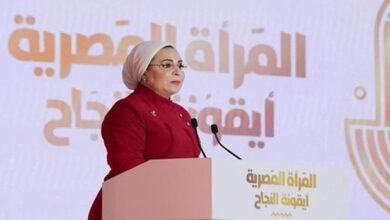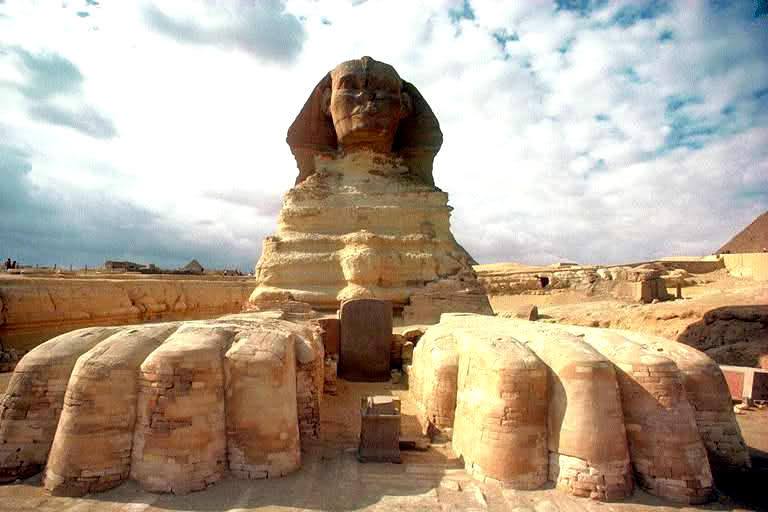
Another International Women's Day has rolled around, and another opportunity to honor women who have constantly called for equal rights to help pave the way to equality. In an effort to challenge people’s preconceived notions, an Egyptian caricature artist employed the most powerful tool for conveying a message: art.
Born in Dumiat, and starting off as a cartoonist in Al-Dostor newspaper, Doaa el-Adl has created a career ladder for herself; her great persistence and passion has allowed her to climb by relentlessly taking up her pen to illustrate how Egypt's customs, laws and societal perceptions continue to affect women's lives dramatically.
In her latest publication “An album of 50 women and much more” el-Adl highlights issues that frequently spark controversy in Egyptian society such as female genital mutilation, sexual harassment, underage marriages and human trafficking, particularly of women and children.
“Women’s issues have greatly occupied my mind since lauching my career. Being a woman myself, I often had mixed feelings of pride and distress due to the evidently unfair conditions and unwarranted way women are perceived in society,” el-Adl told Egypt Independent.
El-Adl starts her book with caricatures and illustrations that shed light on negative stereotypes and societal perceptions of women day to day, such as the scrutiny people direct at obese women, single girls, divorcees and dark-skinned women. She then takes the reader into the next chapter of her book, on to a much profound context using illustrations to show violence and crimes against women, and how women are envisioned within these circumstances. Moving on to the core of the book, el-Adl strikes using brand new, noteworthy and detailed caricatures to depict laws in Egypt that are discriminatory against women by citing the exact articles from Egyptian penal codes.
Working with non-governmental organizations in Egypt and abroad, it wasn’t hard for el-Adl to collect information and gather real stories of women's inequality in Egypt and how Egyptian law does not do much in their favor.
“My vision in the beginning was to have the entire book discussing discriminatory laws against women through caricatures, but as I started working I figured it would be a heavy topic for the reader, so I picked laws that are known to be controversial yet will still give the message I was keen to put across,” she said.
Here is a selection of el-Adl’s work on the 10 controversial Egyptian laws deemed discriminatory against women. She describes how each law is unjust below her artwork.
Adultery law

I think this caricature perfectly depicts how discriminatory the law is when it deals to both sexes committing the same crime. It's the first law that I started researching because I find it so flawed in the amount of discrimination it holds. The societal perception of an adulterous woman is harsher than that of a man, even though it's the same act.
The definition and specification of the concept of the crime is different for a man and for a woman. A man is only accused of the crime if he is found in the marital dwelling with another woman other than his wife, while it's not the case for a woman. Even more, a wife that is proved to have committed adultery is sentenced to two years in prison; however, the husband may suspend his sentence, which would not exceed six months anyway. The wife does not have the right to suspend the sentence

The Egyptian law also discriminates between a man and a woman when the perpetrator of the crime of adultery is killed. Should the husband kill his wife when he finds her committing adultery, his sentence will be mitigated. However, if the wife kills her husband for adultery, then Article 273 of the penal code stipulates that the wife shall receive a severe sentence.
Underage marriages

There is a widespread of marriage of underage girls in impoverished villages, where young girls are married off to wealthy Arabs or foreigners for a short period of time; then they get divorced. The government has not combated this phenomenon. Rather, in 2015, the government amended the law on marriage to stipulate that if the groom is foreign and 25 years older than the bride, he must pay her EGP 50,000 at the time the marriage contract is registered.
This law just charges more money for the same process; it doesn't halt this notion which is widespread among us. I see it like I drew the idea: a form of shopping, and yet the Egyptian law doesn't have a solid program to end it.
Domestic violence by fathers or husbands

Many women and girls who are beaten by their fathers or husbands don't speak up. In marriages, wives are financially dependent on their husbands, and in other cases, Article 60 is brought up, which states that this article does not apply to "every act in good faith" pursuant to Sharia law. This provision acknowledges, albeit indirectly, the fact of husbands beating their wives. At the end, most of the cases are depicted in the caricature, she's broken but is still committed to the relationship because she is not the breadwinner, or she doesn't have a job. Egyptian law, to a great extent, still remains insufficient for the protection of girls against domestic violence, particularly in cases of low income or educational status; social reasons prevent her from practicing her right to report this abuse.
Women's right to travel independently

This caricature shows how a girl is rebelling and fighting so hard to get out of "a man's shadow", through the use of colors, and character sizes, the woman is putting in a great effort to leave the man's grip. In Egyptian law, despite the constitutional court issuing a decree granting women the right to travel without prior permission from her father or husband, this right can be restricted by a male family member who applies for a court decision to be issued which prevents her from travelling.
Domestic workers' rights, or lack thereof

They are even running after the vase and not the woman. Unfortunately, domestic workers' rights are non-existent in Egypt. They are a huge segment of society in Egypt and no one voices their concerns and issues. They are extremely marginalized and deprived from their basic rights concerning labor, social security, and health insurance.
Human trafficking of women and children

Women, again, comprise the majority of the victims of human trafficking, as well as children. It's an ongoing business that is not going to be stopped unless there is tangible rule of law, law enforcement and efficient investigative authorities. Women are put in bags and are sent on boats overseas, traded as if they were objects. I find it very unfortunate that we don't stand up enough to stop such degrading crimes.
Inheritance rights

Many women are denied their rights to inheritance due to slow litigation procedures and the complexity of judicial procedures, which often leads to the women missing out on what was supposedly "her right" to begin with.
Female genital mutilation

There is a positive development with regard to the penalty for FGM. The penalty for such a crime has been aggravated from a misdemeanor to felony, with a five to seven-year prison sentence; yet the rates are still very high and many girls die after undergoing the procedure. It's something we can never stop fighting until the practice really ends.
Sexual harassment in the workplace

It happens a lot, and it's really hard to prove and illustrate, but I think this caricature showcases the meaning so easily. Even though sexual harassment is deemed a crime according to Egyptian law, collective sexual assault crimes, anal penetration, oral rape, rape by a foreign object, as well as other forms of sexual violence remain not adequately criminalized. Women's rights are not protected when they are faced with such circumstances.
El-Adl further added that before working on the book, she started looking into the history of caricatures to see how women were featured. She found that they were mostly featured as the mother-in-law, the fat person, and the evil or weak woman.
“In my own caricature, a woman is an active participant, a dynamic entity, one that can mouth the comment. I empower women through my art, not just because I am a woman; I always tend to empower the party that is being weakened.” She added that she wanted this book to serve as a direct message and empower women to just be.
"All women should take great pride in being one; she shouldn't care about what society thinks of her or how it marginalizes and discriminates against her. She is capable of being whatever she wants. I don't want to see any defeated soul within her. We are equally free," el-Adl said.





